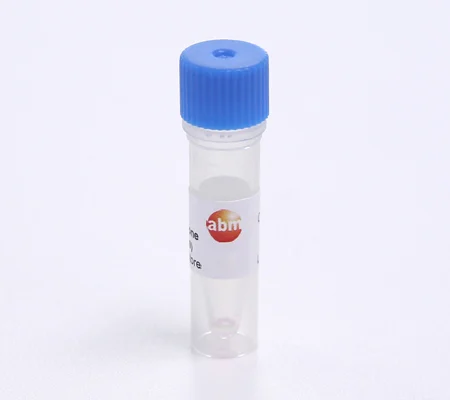
Prigrow III Medium

| CAT.NO | UNIT |
|---|---|
| TM003 | 500ml |
| Description | abm’s PriGrow Media Series for mammalian cell culture is composed of high-quality, specific formulations for the optimal growth of different types of primary cells.
PriGrow media is offered as a basal, serum and antibiotic-free formula to provide the end user with the flexibility of further supplement and serum addition if required. Each lot has been fully tested and optimized for the ability to support the growth of the intended primary cells, in addition to being QC tested for sterility, pH, osmolality and endotoxin levels. Special media modification is available as a Custom Media Service, please contact a technical representative at technical@abmgood.com for more details. |
|---|---|
| SKU | TM003 |
| Caution | For research use only and is not intended for therapeutic or diagnostic applications. abm products are intended for laboratory research purposes only, unless noted otherwise. They are not intended for use in humans. abm makes no warranties or representations as to the accuracy of the information on this site. Citations from literature and provided for informational purposes only. abm does not warrant that such information has been shown to be accurate. |
| Endotoxin Level | ≤ 1EU/ml |
| Osmolarity | 315-350 mOsm/kg |
| pH | 7.0-7.4 |
| Sterility | Pass |
| Storage Condition | Store at 2-8°C. |
| Unit quantity | 500ml |
Supporting Protocol
MSDS
QC
- lot. C11216001
- lot. C03916019
- lot. C31615006
- lot. 10013676
- lot. 10013688
- Lot. SRNBF6341
- Lot. SRNBF5361
Other
I bought a cell line called AQP4 stabel transfected from your company. This cell line need to use your Prigrow III medium but I didn't order it. Which kinds of medium can I use to culture it, DMEM, RPMI1640 or others?
PriGrow III was optimized for this particular cell line. We will not be able to guarantee optimized cell proliferation if you use other medium. These cells will survive in DMEM if you choose.
Do we need anti-biotics in the media?
ABM's PriGrow consists of basal medium only. In order to make it into complete media, usually one needs to add 10% FBS as well as antibiotics, if desired. To answer the question, yes you will need to add your own antibiotics or antifungal solution.
Can you formulate this media as a Lysine and Arginine deficient media for labeling?
Yes we will be able to formulate the media to be lysine and arginine deficient. You will have to specify this request upon placing an order- the price will be the same as our PriGrow series.
What is the color of the PriGrow media?
All of ABM's PriGrow media are red, as they contain Phenol Red Indicator.
I would like to purchase a compatable media to PriGrow, could you please recommend one?
We have optimized our media composition to provide the best growth conditions for the cell types it supports. We do not carry out testing of other products to be able to suggest alternatives that can perform to the same standards.
Can this media be frozen and thawed?
Freezing the media may compromise the quality of the product, therefore we advise only to store at 2-8°C
What is the difference between PriGrow I, II, III or IV?
Each medium is optimized with our proprietary formulation to support the proliferation and growth for different cell types.
For the PriGrow Series, are they serum free media?
Yes, PriGrow Series are provided as serum free media. The end user has to add FBS to make the media complete.
Is a free sample for the media available?
Unfortunately we do not offer free samples for this product.
What is the concentration of L-cystine and glucose in PriGrow III?
The concentration of L-cystine is less than 0.2 mM, and the glucose is 4.05 - 4.95 g/l in Cat#TM003.
Do you supply media without phenol red?
We do provide Prigrow media without phenol red upon request. Please e-mail quotes@abmgood.com to request a quote.
a{color:#b7472a;}
- Kim, BS et al. "Human collagen-based multilayer scaffolds for tendon-to-bone interface tissue engineering" J Biomed Mater Res A. : (2013). DOI: 10.1002/jbm.a.35057. PubMed: 24327550.
- Chensnokova, V et al. "Growth hormone is a cellular senescence target in pituitary and nonpituitary cells" Proc Natl Acad Sci U S A. 110(35):E3331-9. (2013). DOI: 10.1073/pnas.1310589110. PubMed: 23940366.
- Ravikumar, P. et al. "α-Klotho protects against oxidative damage in pulmonary epithelia" American Journal of Physiology 307(7):566-576 (2014). PubMed: 25063799.
- Kim, , J. et al. "The role of heat shock protein 90 in migration and proliferation of vascular smooth muscle cells in the development of atherosclerosis" Journal of Molecular and Cellular Cardiology 72:157-168 (2014). PubMed: 24650873.
- Xu, Z et al. "MicroRNA-381 Negatively Regulates TLR4 Signaling in A549 Cells in Response to LPS Stimulation" Biomed Res Int 849475: (2015). DOI: 10.1155/2015/849475. PubMed: 26688820 .
- Kang, SS et al. "Staphylococcus aureus induces IL-8 expression through its lipoproteins in the human intestinal epithelial cell, Caco-2" Cytokine 75(1):174-80 (2015). DOI: 10.1016/j.cyto.2015.04.017. PubMed: 25982554.
- Kang, H et al. "Magnobovatol inhibits smooth muscle cell migration by suppressing PDGF-Rβ phosphorylation and inhibiting matrix metalloproteinase-2 expression" Int J Mol Med 5:1239-1246 (2016). DOI: 10.3892/ijmm.2016.2548. PubMed: 27049716. Application: Culture.
- Kim, J., Jang, S. W., Park, E., Oh, M., Park, S., & Ko, J. "The role of heat shock protein 90 in migration and proliferation of vascular smooth muscle cells in the development of atherosclerosis" Journal of molecular and cellular cardiology 72:157-167 (2014).
- Kim, Y. E., Choi, H. C., Lee, I. C., Yuk, D. Y., Lee, H., & Choi, B. Y. "3-Deoxysappanchalcone promotes proliferation of human hair follicle dermal papilla cells and hair growth in C57BL/6 mice by modulating Wnt/β-catenin and STAT signaling" Biomolecules & therapeutics 24(6):572 (2016).
- Lin, Y., Chang, T., Shi, C., Wang, Y., Ho, W., Huang, H., … Chen, M. "Liver X Receptor/Retinoid X Receptor Pathway Plays a Regulatory Role in Pacing‐Induced Cardiomyopathy" Journal of the American Heart Association 8(1): (2019). DOI: 10.1161/jaha.118.009146.
- Tsilioni, I., & Theoharides, T. C. "Extracellular vesicles are increased in the serum of children with autism spectrum disorder, contain mitochondrial DNA, and stimulate human microglia to secrete IL-1β" Journal of neuroinflammation 15(1):239 (2018).
- Tsilioni, I., Patel, A. B., Pantazopoulos, H., Berretta, S., Conti, P., Leeman, S. E., & Theoharides, T. C. "IL-37 is increased in brains of children with autism spectrum disorder and inhibits human microglia stimulated by neurotensin" Proceedings of the National Academy of Sciences 116(43):21659–21665 (2019). DOI: 10.1073/pnas.1906817116.
- Cho, . "U" S. Patent Application No. 0356397 A1 : (2018).
- Xu, Z., Dong, D., Chen, X., Huang, H., & Wen, S. "MicroRNA-381 negatively regulates TLR4 signaling in A549 cells in response to LPS stimulation" BioMed research international 2015: (2015).


